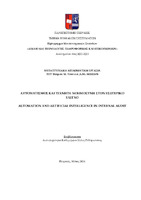Αυτοματισμός και τεχνητή νοημοσύνη στον εσωτερικό έλεγχο
Automation and artificial intelligence in internal audit

View/
Keywords
Αυτοματοποίηση ; Εσωτερικός έλεγχος ; Σύστημα εσωτερικού ελέγχου ; Τεχνητή νοημοσύνη ; Προσωπικά δεδομένα ; ΈλεγχοςAbstract
The goal of the diplomatic essay was to study the applications deployed to automate the business processes, while also introducing Artificial Intelligence in the Internal Control Systems implemented by private organizations as well as those of the public sector. The Internal Control System comprises of three lines of defence, namely the business functions for the products and services provided to the customers, the risk management function, and the audit.
The applicable legislative framework with regards to the Artificial Intelligence mainly consists of the European Union Regulation (AI Act), including the rules and the standards which are gradually being created in the member states to establish a regulatory environment for the development and implementation of AI related appliances. Moreover, the international auditing institutes have created standards which may be also incorporated in the local laws of various countries to ensure homogenization and full applicability by all the stakeholders.
The automation of the business processes, including information systems adopting Artificial Intelligence, are applied almost in every aspect of an organization. Consequently, their adoption, their utilization and their evaluation by the audit function deems mandatory. Towards this purpose, the involved and inherent risks should be defined and assessed, including those related with their development and training with reliable and unbiased data and methodology.
The implementations provide for information systems addressed to all the three lines of defence, such as the automation of the production line and the quality management and improvement (e.g. robotics, automated customer care centres), the continuous risk monitoring, the continuous assessment of compliance with the regulatory and the legislative framework, intrusion detection and prevention mechanisms for the Web Banking systems, the analysis of transactions deploying data analytics techniques, the credit risk scoring and evaluation, the automated approval or rejection of a loan application, as well as more sophisticated solutions based on machine learning and natural language processing.
The Artificial Intelligence is a reality and has invaded the human daily activity, thus, affecting several aspects and improving everyday life. The morality beside the possibility for decision-making information systems, based on the analysis performed by the model and the training data provided by the end-user, raises questions that require persuasive responses. It is expected that the deployment of IT systems adopting Artificial Intelligence will enhance and improve the decision-making process and human intelligence without in any case replacing it.


